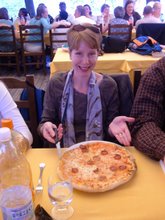My Dad has never liked Chicago. It wouldn’t make him unhappy if Cook County lobbied for statehood and won it. As far as he’s concerned, they can have everything north of Springfield for themselves. Dad probably shudders every time he thinks about raising a kid who loves Chicago enough to visit at least twice a year. He lives four hours “downstate” (as they say in Chicago) just 100 miles or so from St. Louis, where Cardinal fans are one of the few things more abundant than people who bash Chicago. That’s why it’s so surprising that Dad is a lifelong Cubs fan. “Everyone around here roots for the Cards,” he said when I asked him about that. “I guess I wanted to be different.” That’s how I feel when I listen to the news these days—like a contrarian.
Normally, I can wrap myself around fear in a heartbeat. It’s easy and somewhat legitimate to do that in today’s circumstances. What’s harder, but so much better for us, is to remember who we are and where we came from. Most adults today were loved and taught by people who survived and thrived through hardship—people who saved baggies and cottage cheese containers, folded foil and wrapping paper, and stretched a gallon of milk by mixing it with its powdered version and water.
Carrying Meals on Wheels to the elderly when they themselves are elderly, they never retire or quit. They resole their shoes, install their own windows, clean their own gutters, reupholster furniture, and eat from gardens for as long as they possibly can. They never paid others to do what they could do themselves. They expected life to be tough because it was. As kids, some remember nearly dying from delight when they got an orange at Christmas. Surely we learned something from them that will propel us forward!
When our family got together over Thanksgiving, my brothers and I were remembering Flossie Miller, an elderly widow who lived next door when we were kids. As far as we could tell, Mrs. Miller lived mostly on savings, (it may have been millions or next to nothing) Social Security and the $1 piano lessons she gave us. She didn’t have a car and she was too old to walk, so she sent my brothers to the store for mush, bread and sweet milk. (People of her generation referred to whole milk as sweet milk.) We can’t remember much else on the grocery list, so we imagine those things made up the bulk of her diet. Mrs. Miller accomplished a lot with very, very little. She handled herself as a refined and proper lady, in need of no one’s pity even with what seemed a meager existence. I think about her example and I know we’ll make it no matter what.
Just before his death in October, Studs Terkel, author of Hard Times: An Oral History of the Great Depression, had this to say about the current state of affairs: “I think if we don’t remember what happened in the past and if we don’t remember there’s a way out, it’ll be an iffy question as to which way we go. The lessons of the Great Depression? Don’t blame yourself. Turn to others. Take part in the community. The big boys are not that bright.” He says it well, especially for a guy from Chicago. Right Dad?
December 21, 2008
Subscribe to:
Comments (Atom)









